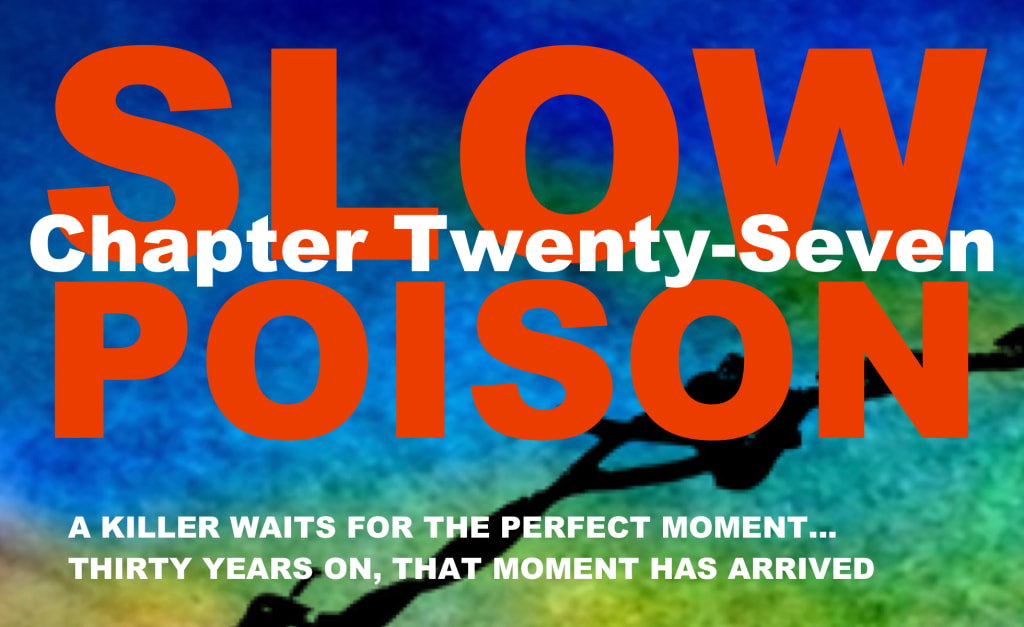Slow Poison - Chapter Twenty-Seven
Chapter Twenty-Seven

Chapter Twenty-seven
Stonehouse
The boy never came now. Nor did the Mother. The Husband had looked in once or twice before the snows had gone, but he had soon relinquished the chore. The old man was seldom lonely as he sat out his days in the first floor council flat. The gas meter ticked on, consuming the nickel coins he set aside. The world had shrunk to the dimensions of the cramped kitchen, to the area of the chipped Formica table. He sat there between sleep, sipping the cooling instant coffee that stood ever within his reach. One or the other of the books would lie open before him; diary or the book of Ilya’s verse. The verse was never read, the strong line-work of the illustrations too powerful a magnet to allow his eyes to stray, but the power of the images paled beside his own words. The fragile scrawl held the ghosts within the prison of the cracked kitchen walls. The dark stars of her eyes held his own as he followed the marks he had left on the pages of the diary.
All that was left of the boy’s legacy were the torn edges that clung to the stitched spine of the leather-bound book. He never came now. Never came for the biscuits; one for now, one for the pocket. The shuffling journeys to the frightening supermarket were for nothing. Sometimes, the boy would call to him, crying for help, and he would creak to the window to look. But he never found him among the grubby faces of the bikers that plagued the Estate.
Someone had brought him chips. A brief spark of concern after the snows had retreated, leaving the flotsam of cold bones upon their consciences. The steaming fatty chips were wrapped in an old copy of The Sun, dated January the 28th. The words were foreign and told the old man nothing. There were two photographs upon the greasy paper, one of a man, one of a child. Trim’s face was blurred, grainy and indistinct. The other picture was of a small girl, laughing out of the page, everything before her. Such hope. The old man had smoothed out the greasy page on the Formica tabletop, his fingers pressing the creases away. She was so like her. So like his Giselle. There would be no confusing the one with the other, but, even through the coarse dots that made up the whole, those eyes sparkled out into the room, bringing tears to his failing eyes.
“Oh Giselle. Oh, my love.”
Now the snows were all gone, and although the days were cold and rain filled, it was July. The diary lay open at a random page. He traced the words with a trembling finger.
“We should have stayed, could have stayed, should have stayed in the summer cottage.”
There had been a dream. He had woken in a cold sweat to the echo of an ear-shattering explosion. The house had shuddered, sending dishes and glasses falling into one another in the dark cupboards. He opened his eyes and looked around another room, not the room of his dream. Outside the snow had blanketed everything, deadening the sounds of those early hours before dawn.
He shivered under the thin blankets, his sodden clothes little help against the unheated objects in the barrack bedroom. The chair was cold, the floorboards, the bedposts, the light fitting -everything radiated cold. His dream had been filled with fearful fires and shouts. No one expected their quiet Sunday to be so suddenly torn apart. From the balcony they had watched the Spitfires scream across the sky and over the house.
“Papa, what are they doing?”
The aircraft turned in a decisive arc, returning low and whining, warning those with sharp ears.” The Fokker Factory.” But the bombs missed the factory, caught the houses, had flown too high, had mistrusted the wind. And the shock waves took the house and shook the windows and they shattered to the floor.
“Papa I’m frightened.”
“It’s all right. It will be all right.”
The factory escaped. Would run at maximum production under its camouflage thatching for another week. Would die on anther Sunday.
From the rear windows they could see the smoke and the flames. Through the broken holes they could smell the smoke from the fire.
“Papa where are you going?”
He left the house following the trail, heading along the Van Der Pekstraat, could see the Saturday crowds swarming the pavements with noise and cries and moans beneath the roar of the fire. Eight houses gone, from forty-one to fifty seven, completely destroyed, timbers and rag dolls thrown high into the sky to rain down in dust. A hundred souls drifted helplessly. The day was perfect. A blue skied July day.
“So the poet’s had a dream.” they sneered.
But they listened. The prisoners listened to his every word and the sullen reluctance to speak of their past and their part, melted slowly away in the heat of the hatred he fuelled with his dark dream. Others like him, lethargic and dispirited, found the electric spark of vengeance heady with the thrill of absolute power. Someone had to pay.
It was decided: a sacrifice would be chosen to appease the god that had abandoned them all for so long, a sacrifice to free all of the trapped souls that would not leave them in peace.
His skin was as white as a lamb, the frail youth that spoke none of their tongues. For some of them the night would bring the first, maybe the only taste of the overwhelming power that comes with the taking of a life. It had to be done. It was ordained so. It was to be their only voice. It was so easy. The room full of men let go of their reason as easily as the weak lungs puffed out his last breath. Others bore him away, the frail youth that spoke none of their tongues, and with the new bond that had grown with the deed, the others chose to face the night ahead.
The suicide had been so willingly accepted, but all luck left them with the deed. Throughout the night the cruel Cotswold winds beat at the unyielding flesh hanging in the snow. Some of the men slept well, others slept fitfully, held from sleep by the slap, slap, slap of flesh upon wood.
“Papa papa papa.”
SNAP! The book snapped shut.
“Daydreaming again, Isaacs?”
The voice cut through the daydream like a scythe.
“You will learn nothing about life sitting there with your head in the clouds. Now - pay attention everyone. Today we are going to learn about fractions.”
The old man held the pencil with difficulty, the soft lead point leaving an uneven scrawl across the page.
How different today. How tainted everything is. I can see the scars of those days lying everywhere. The rubbled chasms, once numbered, a letterbox, a row of bells with familiar names. Wallpaper, chosen with care, left hanging high above the street, flapping in the rain, competing with the squalling seagulls.
Where was the boy? He had said he would come. Where was he? The Bristol Express roared by, shaking the foundations. They had forced him to watch the trains arriving, spewing forth their cargoes of anonymous souls they told him were his kind. He searched the faces - some sad and distinguished, some with dull and stupid expressions. And there would have been housewives and carpenters, pianists and merchants, comedians and singers and fools, all with but one fate.
He was informed of the numbers. Each document passed under his fingers. To close the mind to those familiar names drained him of compassion, of pity.
“Give them no thought. Each of us must die. It is our destiny.”
Had he believed that? He recalled praying for immortality, for eternal life, for the chance to revenge, to avenge, to pain.
“One tick, you’re alive, one tick, you’re dead.”
We could have stayed.
Where was the boy? The light was failing. The boy had said he would come. He had promised. There were biscuits, chocolate digestives, the boy’s favourites; one for now, one for the pocket.
They had watched silently as the soldiers lowered the frozen corpse of the boy from Dresden slowly to the ground. They winched him down inch by inch. The corpse might have been a starched mannequin. No one spoke. None of them spoke of the boy ever again. Suicide was the easy option. The least paperwork, the cleanest end. And no one knew his name. But the old man would hold forever the after image of his eyes as they squeezed the life from the helpless pinioned boy.
Where was the boy? He had promised he would come. Where was the sun? Would there ever be sun again? Not on this day. The walls closed in with the falling of night, condensation forming on the green distempered walls. There were the sounds of a disparate community busying itself for the entertainment of no one. The full moon shone in vain far behind the dense cloud of the waning summer, the nights drawing in, faces pale in the mosquito bloodied street lamp’s light. Shivering in scraps of fabric, the offspring of the Snake Island Girls paraded themselves in the High Street, longing for the throaty roars they would never have believed possible of their pot-belied fathers.
The Nortons rumbled gently at the Standish corner, spilling rainbow essences into the residue of the sudden twilight showers that gave a patent leather sheen to the dirty hide jackets of the lads. And they were hot, the lads, weighing up the delights of the evening ahead, bright plans for the stars of the Severn Bridge Service Station. And with a soundless signal from their queen bees, they slipped away in formation, the noise, layer upon layer, heralding their coming to the lesser drones.
Where was the boy? He had promised he would come. The diary lay open, drawing the dim light into the yellowed pages. The old man scratched at a stain upon the page. There was a sudden bitter scent that filled the room. Juniper. And he was there. Watching the slender fingers plucking the fine-needled branches to fill the little blue vase from the attic window. And, just as suddenly, the scent was gone, leaving the stale odour of lonely meals and cold coffee. Life should end so quickly, disappearing as swiftly as the fragrance of a torn flower.
Another life; the tender field grasses lay in folds of gauze, the roots and mosses lay damp, in aquarelle arrangements in the slipper box, so small, so perfect for our treasures. The berry tips lay hard and green, royal thorns adorning velvet skin. I will impart the prize of immortality, an eternity of two-dimensioned artifice. My charcoal meditations will live long after the berries have rotted away.
The old man closed the book for one last time. There was nothing more to read. He looked out at the half-darkness and waited for the boy to come.
About the Creator
David Philip Ireland
David Philip Ireland was born in Cheltenham in 1949
David has published work in music, novels and poetry.
To discover David’s back catalogue, visit: linktr.ee/davidirelandmusic






Comments
There are no comments for this story
Be the first to respond and start the conversation.